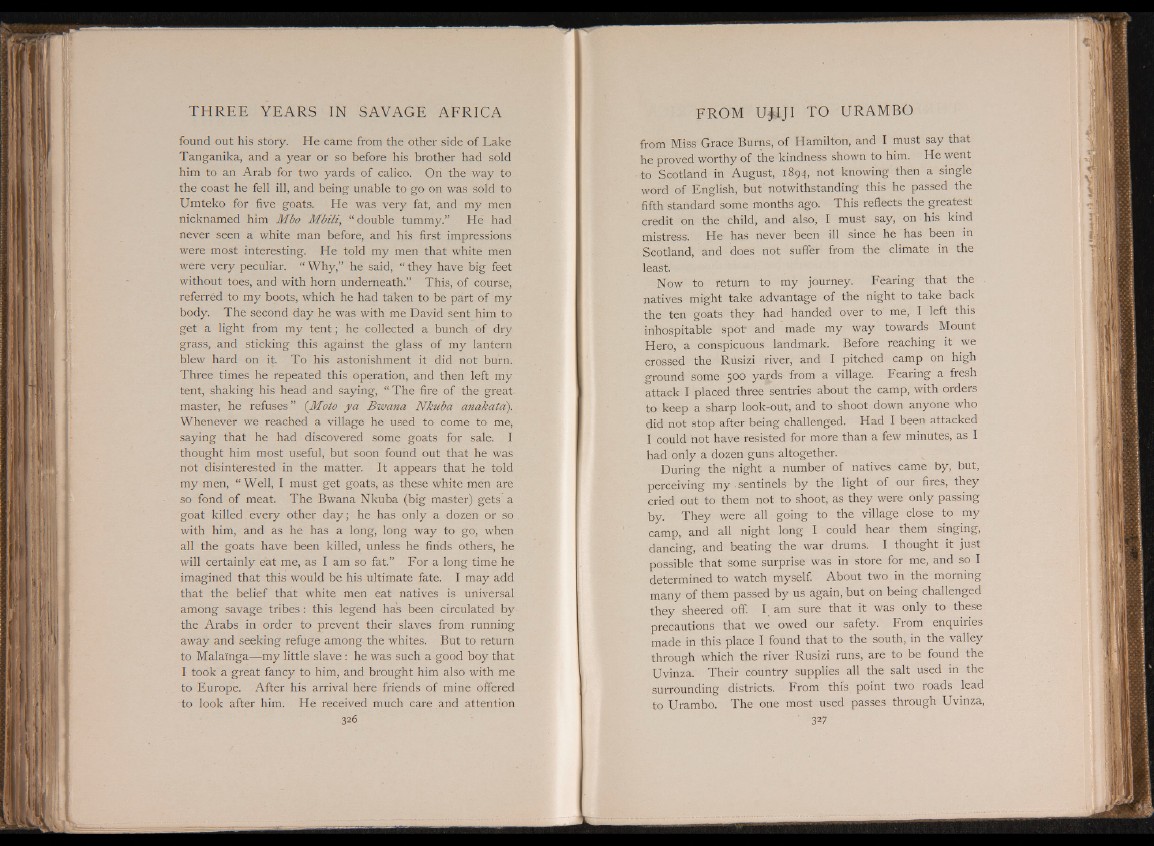
found out his story. He came from the other side of Lake
Tanganika, and a year or so before his brother had sold
him to an Arab for two yards of calico. On the way to
the coast he fell ill, and being unable to go on was sold to
Umteko for five goats. He was very fat, and my men
nicknamed him Mbo Mbili, “ double tummy.” He had
never seen a white man before, and his first impressions
were most interesting. He told my men that white men
were very peculiar. “ Why,” he said, “ they have big feet
without toes, and with horn underneath.” This, of course,
referred to my boots, which he had taken to be part of my
body. The second day he was with me David sent him to
get a light from my tent, he collected a bunch of dry
grass, and sticking this against the glass of my lantern
blew hard on it. To his astonishment it did not burn.
Three times he repeated this operation, and then left my
tent, shaking his head and saying, “ The fire of the great-
master, he refuses” (Moto ya Bwana Nkuba anakata).
Whenever we reached a village he used to come to me,
saying that he had discovered some goats for sale. I
thought him most useful, but soon found out that he was
not disinterested in the matter. It appears that he told
my men, “ Well, I must get goats, as these white men are
so fond of meat. The Bwana Nkuba (big master) gets a
goat killed every other day; he has only a dozen or so
with him, and as he has a long, long way to go, when
all the goats have been killed, unless he finds others, he
will certainly eat me, as I am so fat.” For a long time he
imagined that this would be his ultimate fate. I may add
that the belief that white men eat natives is universal
among savage tribes: this legend has been circulated by
the Arabs in order to prevent their slaves from running
away and seeking refuge among the whites. But to return
to Mala'inga—my little slave : he was such a good boy that
I took a great fancy to him, and brought him also with me
to Europe. After his arrival here friends of mine offered
to look after him. He received much care and attention
326
from Miss Grace Burns, of Hamilton, and I must say that
he proved worthy of the kindness shown to him. He went
to Scotland in August, 1894, not knowing then a single
word of English, but notwithstanding this he passed the
fifth standard some months ago. This reflects the greatest
credit on the child, and also, I must say, on his kind
mistress. He has never been ill since he has been in
Scotland, and does not suffer from the climate in the
least.
Now to return to my journey. Fearing that the
natives might take advantage of the night to take back
the ten goats they had handed over to' me, I left this
inhospitable spot and made my way towards Mount
Hero, a conspicuous landmark. Before reaching it we
crossed the Rusizi river, and I pitched camp on high
ground some 500 yards from a village. Fearing a fresh
attack I placed three sentries about the camp, with orders
to keep a sharp look-out, and to shoot down anyone who
did not stop after being challenged. Had I been attacked
I could not have resisted for more than a few minutes, as I
had only a dozen guns altogether.
During the night a number of natives came by, but,
perceiving my . sentinels by the light of our fires, they
cried out to them not to shoot, as they were only passing
by. They were all going to the village close to my
camp, and all night long I could hear them singing,
dancing, and beating the war drums. I thought it just
possible that some surprise was in store for me, and so I
determined to watch myself. About two in the morning
many of them passed by us again, but on being challenged
they sheered off. I am sure that it was only to these
precautions that we owed our safety. From enquiries
made in this place I found that to the south, in the valley
through which the river Rusizi runs, are to be found the
Uvinza. Their country supplies all the salt used in the
surrounding districts. From this point two roads lead
to Urambo. The one most used passes through Uvinza,
327